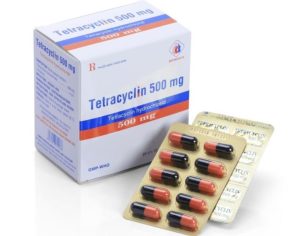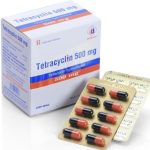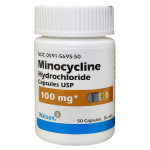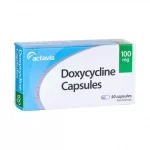Tetracycline is a powerful antibiotic; not only is the antibiotic used for dealing with a variety of conditions like cholera, typhus, urinary tract infections, brucellosis, and anthrax, but it has proven a successful treatment option for many acne sufferers. Tetracycline is actually an umbrella term that covers an array of different antibiotics that can be used for treating acne. Common Tetracycline for acne medications prescribed by doctors include Minocycline, Doxycycline, Achromycin, Terramycin, Monodox, Monocin, Dynacin, Vibramycin, Doryx, Declomycin, Oxytetracycline, Sumycin, and Democlcycline.

How Does Tetracycline Work for Acne?
Tetracycline is an antibiotic that can be consumed as an oral medication. Tetracycline is also supplied in an ointment or cream that can be directly applied to the area of the skin affected by acne eruptions. In some cases, a doctor may also offer a patient a topical solution like Azeliac acid or Retin-A along with an oral Tetracycline medication to combat acne conditions.
Tetracycline for acne works by hindering bacteria growth on the skin. In addition, this antibiotic helps to reduce inflammatory conditions in the body: this proves considerably beneficial to patients with inflamed acne conditions. When Tetracycline is used as directed, it can make acne eruptions less irritating, sore, red, and inflamed.
Tetracycline Dosage for Acne
Tetracycline for acne is often prescribed at a dosage ranging from 250mg to 500mg daily. Usually the patient will have to take two doses every day until the entire course of antibiotics is gone. Occasionally, Tetracycline is offered in the form of an oral suspension. Usually the dosage for an oral suspension is 1 teaspoon, 5 ml, or 125 ml a day.
A course of antibiotics often runs about two weeks time. After the medication is gone, a doctor can reevaluate a patient’s condition to see if the Tetracycline for acne defense, repair, and prevention has proven successful. If not, a new course of Tetracycline may be offered or the doctor may decide to try another course of action. If the Tetracycline works, the patient will continue to take the medication at lower and lower dosages until the acne condition disappears.
Side Effects of Tetracycline for Acne
Since Tetracycline is an antibiotic, it is only offered through a prescription. This medication is associated with some mild side effects that may or may not be experienced by the individual that uses the medication. Common side effects that one might experience when using Tetracycline for acne include the development of a rash, dizziness, the onset of oral thrust, yeast infections, and Candida overgrowth, a sore throat, diarrhea, stomach upset, and vomiting. Some patients have reported experience photosensitivity when taking Tetracycline too.
Tetracycline for acne is not offered to nursing females or pregnant women. Nursing mothers might pass on the medication to the baby during the breastfeeding process, and Tetracycline has been found to stain teeth as well as hinder growth in children. People who are prescribed Accutane or isotretinoin also cannot use Tetracycline since the medications interact.
Tetracycline interacts with a variety of medications, so you should talk to your doctor about any medications you are taking before you begin using Tetracycline for acne defense purposes. The antibiotic can interact with calcium carbonate products and antacids like Rolaids and Tums, Maalox, Mylanta; calcium, magnesium, or aluminum based antacids, bismuth subsalicylate, iron supplements, and dairy foods. Tetracycline can also interact with Phenobarbital, barbiturates, carbamazinepine, pheonytoin, and warfarin. It can even diminish the effectiveness of certain oral contraceptives.
Tetracycline for Acne versus Alternative Antibiotics
Tetracycline is not ideal for every individual who suffers from acne related conditions. First, it is not recommend for children under the age of 12 years old. Some researchers suggest that children ages eight and over can use the antibiotic, however, the medication has been found to cause growth issues and the discoloration of the teeth in children. Some antibiotics can be consumed with food, but this antibiotic should be consumed on an empty stomach; this means it may not prove ideal for a person who prefers to take medication with a meal. Some people find that they can tolerate generic forms of Doxycycline better than tetracycline; however, Doxycycline is associated with the development of greater photosensitive issues than tetracycline.
Tetracycline treats inflamed acne conditions while a medication like Minocycline is used for dealing with the pus that develops following the growth of bacteria. When compared to Tetracycline, Minocycline is also found to create fewer antibiotic resistance issues. Antibiotics like Erythromycin and Clindamycin are offered in topical remedies. The latter medicines work in helping to open pores and keeping them open so that they do not become clogged with acne causing material. Erythromycin has anti inflammatory and antimicrobial properties, while Clindamycin destroys P. acnes bacteria and help in diminishing inflammation.
Tips for Tetracycline Usage
When using tetracycline for acne treatment, you must remember to take the medicine when your stomach is empty since food can hinder the body’s ability to absorb Tetracycline. This means you need to wait at least two hours after or before your meals before you can take the medication. To make it easy to remember when to take your first and second dose for the day, you might want to take the medication two hours before you eat breakfast and two hours before you eat dinner.
In addition, make sure you maintain a regimen by taking the medicine the same time every day for the next seven to fourteen days; doing so will ensure you have an adequate amount of the antibiotic in your blood stream at all times.
Further, do not lie down right away after taking a medication like Tetracycline; doing so can cause irritation in your esophagus. To keep esophageal irritation to an all time minimum, drink eight ounces of water whenever you take the medication. Avoid using Tetracycline before you go to sleep at night as well.





